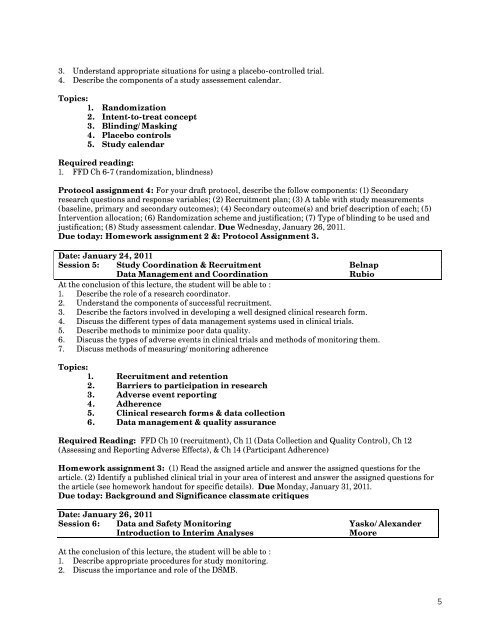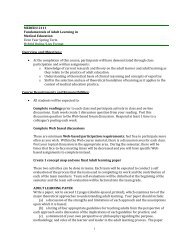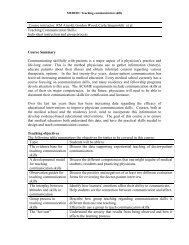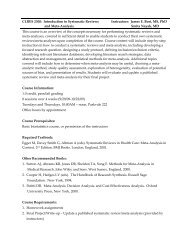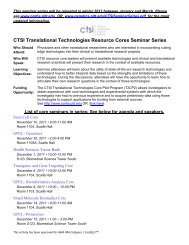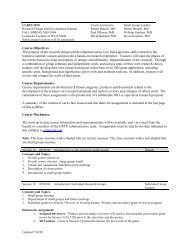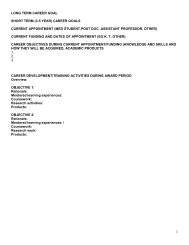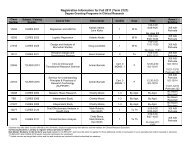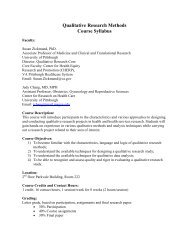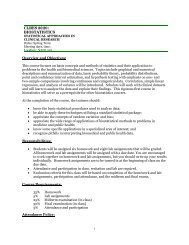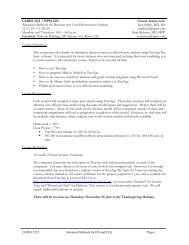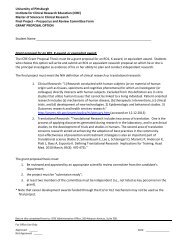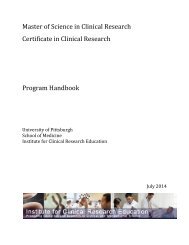1 CLRES 2800 Fundamentals of Clinical Trials - Institute for Clinical ...
1 CLRES 2800 Fundamentals of Clinical Trials - Institute for Clinical ...
1 CLRES 2800 Fundamentals of Clinical Trials - Institute for Clinical ...
Create successful ePaper yourself
Turn your PDF publications into a flip-book with our unique Google optimized e-Paper software.
3. Understand appropriate situations <strong>for</strong> using a placebo-controlled trial.4. Describe the components <strong>of</strong> a study assessement calendar.Topics:1. Randomization2. Intent-to-treat concept3. Blinding/Masking4. Placebo controls5. Study calendarRequired reading:1. FFD Ch 6-7 (randomization, blindness)Protocol assignment 4: For your draft protocol, describe the follow components: (1) Secondaryresearch questions and response variables; (2) Recruitment plan; (3) A table with study measurements(baseline, primary and secondary outcomes); (4) Secondary outcome(s) and brief description <strong>of</strong> each; (5)Intervention allocation; (6) Randomization scheme and justification; (7) Type <strong>of</strong> blinding to be used andjustification; (8) Study assessment calendar. Due Wednesday, January 26, 2011.Due today: Homework assignment 2 &: Protocol Assignment 3.Date: January 24, 2011Session 5: Study Coordination & Recruitment BelnapData Management and CoordinationRubioAt the conclusion <strong>of</strong> this lecture, the student will be able to :1. Describe the role <strong>of</strong> a research coordinator.2. Understand the components <strong>of</strong> successful recruitment.3. Describe the factors involved in developing a well designed clinical research <strong>for</strong>m.4. Discuss the different types <strong>of</strong> data management systems used in clinical trials.5. Describe methods to minimize poor data quality.6. Discuss the types <strong>of</strong> adverse events in clinical trials and methods <strong>of</strong> monitoring them.7. Discuss methods <strong>of</strong> measuring/monitoring adherenceTopics:1. Recruitment and retention2. Barriers to participation in research3. Adverse event reporting4. Adherence5. <strong>Clinical</strong> research <strong>for</strong>ms & data collection6. Data management & quality assuranceRequired Reading: FFD Ch 10 (recruitment), Ch 11 (Data Collection and Quality Control), Ch 12(Assessing and Reporting Adverse Effects), & Ch 14 (Participant Adherence)Homework assignment 3: (1) Read the assigned article and answer the assigned questions <strong>for</strong> thearticle. (2) Identify a published clinical trial in your area <strong>of</strong> interest and answer the assigned questions <strong>for</strong>the article (see homework handout <strong>for</strong> specific details). Due Monday, January 31, 2011.Due today: Background and Significance classmate critiquesDate: January 26, 2011Session 6: Data and Safety Monitoring Yasko/AlexanderIntroduction to Interim AnalysesMooreAt the conclusion <strong>of</strong> this lecture, the student will be able to :1. Describe appropriate procedures <strong>for</strong> study monitoring.2. Discuss the importance and role <strong>of</strong> the DSMB.5


